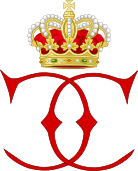Rainier III, Prince of Monaco
Rainier III (Rainier Louis Henri Maxence Bertrand Grimaldi; 31 May 1923 – 6 April 2005) was the Prince of Monaco from 9 May 1949 to his death in 2005. Rainier ruled the Principality of Monaco for almost 56 years, making him one of the longest ruling monarchs in European history. Though internationally known for his marriage to American actress Grace Kelly, he was also responsible for reforms to Monaco's constitution and for expanding the principality's economy from its traditional casino gambling base to its current tax haven role. Gambling accounts for only approximately three per cent of the nation's annual revenue today; when Rainier ascended the throne in 1949, it accounted for more than 95 per cent.[1]
| Rainier III | |||||
|---|---|---|---|---|---|
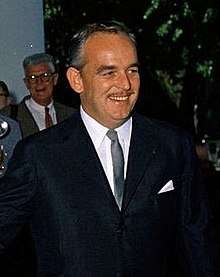 Rainier in 1961 | |||||
| Prince of Monaco | |||||
| Reign | 9 May 1949 – 6 April 2005 | ||||
| Predecessor | Louis II | ||||
| Successor | Albert II | ||||
| Regent | Albert (2005) | ||||
| Born | 31 May 1923 Prince's Palace of Monaco | ||||
| Died | 6 April 2005 (aged 81) Cardiothoracic Center of Monaco | ||||
| Burial | 15 April 2005 Cathedral of Our Lady Immaculate, Monaco | ||||
| Spouse | |||||
| Issue | |||||
| |||||
| House | Grimaldi-Polignac | ||||
| Father | Count Pierre of Polignac | ||||
| Mother | Princess Charlotte, Duchess of Valentinois | ||||
| Religion | Roman Catholic | ||||
Early life
Rainier was born at Prince's Palace in Monaco, the only son of Princess Charlotte, Duchess of Valentinois, and her husband, Prince Pierre, Duke of Valentinois. Rainier was the first native-born prince since Honoré IV in 1758. Rainier's mother was the only child of Louis II, Prince of Monaco, and Marie Juliette Louvet; she was legitimised through formal adoption and subsequently named heir presumptive to the throne of Monaco. Rainier's father was a half-French, half-Mexican who adopted his wife's dynasty, Grimaldi, upon marriage and was made a Prince of Monaco by marriage by Prince Louis, his father-in-law. Rainier had one sibling, Princess Antoinette, Baroness of Massy.[2]
Rainier's early education was conducted in England, at the prestigious public schools of Summerfields in St Leonards-on-Sea, Sussex, and later at Stowe, in Buckinghamshire. After England, Rainier attended the Institut Le Rosey in Rolle and Gstaad, Switzerland from 1939, before continuing to the University of Montpellier in France, where he obtained a Bachelor of Arts degree in 1943, and finally to the Institut d'études politiques de Paris in Paris.[2]
In 1944, upon his 21st birthday, Rainier's mother renounced her right to the Monegasque throne and Rainier became Prince Louis's direct heir. In World War II Rainier joined the Free French Army in September 1944, and serving under General de Monsabert as a second lieutenant, and seeing action during the German counter-offensive in Alsace. He received the French Croix de Guerre with bronze star (representing a brigade level citation) and was given the rank of Chevalier in the French Legion of Honor in 1947. Following his decommission from the French Army, he was promoted by the French government as a captain in April 1949 and a colonel in December 1954.[2]
In the 1940s and 1950s, Rainier had a ten-year relationship with the French film actress Gisèle Pascal, whom he had met while a student at Montpellier University, and the couple lived at Saint-Jean-Cap-Ferrat. Rainier's sister, Princess Antoinette, wishing her own son to ascend the throne, spread rumours that Pascal was infertile. The rumours combined with a snobbery over Pascal's family origins ultimately ended the relationship.[3]
Rainier became the Sovereign Prince of Monaco on the death of Louis II on 9 May 1949.[2]
Reign
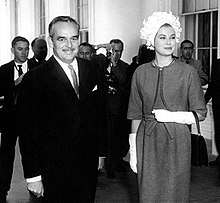
After ascending the throne, Rainier worked assiduously to recoup Monaco's lustre, which had become tarnished through neglect (especially financial) and scandal (his mother, Princess Charlotte, took a noted jewel thief known as René the Cane as her lover). According to numerous obituaries, the prince was faced upon his ascension with a treasury that was practically empty. The small nation's traditional gambling clientele, largely European aristocrats, found themselves with reduced funds after World War II. Other gambling centres had opened to compete with Monaco, many of them successfully. To compensate for this loss of income, Rainier decided to promote Monaco as a tax haven, commercial center, real-estate development opportunity, and international tourist attraction.[4] The early years of his reign saw the overweening involvement of the Greek shipping tycoon Aristotle Onassis, who took control of the Société des Bains de Mer (SBM) and envisioned Monaco as solely a gambling resort. Prince Rainier regained control of SBM in 1964, effectively ensuring that his vision of Monaco would be implemented.[4] In addition, the Societé Monégasque de Banques et de Métaux Précieux, a bank which held a significant amount of Monaco's capital, was bankrupted by its investments in a media company in 1955, leading to the resignation of Monaco's cabinet.
As Prince of Monaco, Rainier was also responsible for the principality's new constitution in 1962 which significantly reduced the power of the sovereign.[5] (He suspended the previous constitution in 1959, saying that it "has hindered the administrative and political life of the country.") The changes ended autocratic rule, placing power with the prince and a National Council of eighteen elected members.
At the time of his death, he was the world's second longest-serving living head of state (independent), just below the King of Thailand, Bhumibol Adulyadej.
Marriage and family
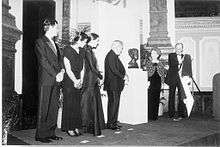
After a year-long courtship described as containing "a good deal of rational appraisal on both sides" (The Times, 7 April 2005, page 59), Prince Rainier married Oscar-winning American actress Grace Kelly (1929–1982)[6] in 1956. The ceremonies in Monaco were on 18 April 1956 (civil) and 19 April 1956 (religious). Their children are:
- Princess Caroline, born 23 January 1957 and now the Princess of Hanover;
- Prince Albert II, born 14 March 1958, inherited the throne of Monaco;
- Princess Stéphanie, born 1 February 1965.
In 1979, Prince Rainier made his acting debut alongside his wife Grace in a 33-minute independent film called Rearranged, produced in Monaco. According to co-star Edward Meeks, after premiering it in Monaco, Grace showed it to ABC TV executives in New York in 1982, who expressed interest if extra scenes were shot to make it an hour long. However, Grace died in a car crash caused by a stroke in 1982, making it impossible to expand the film for American release.[7][8][9]
Rainier then may have been romantically involved with his second cousin, Princess Ira von Fürstenberg, a former actress turned jewellery designer, who is also a Fiat heiress and the former sister-in-law of fashion designer Diane von Fürstenberg. Princess Ira, like him, is a great-grandchild of Lady Mary Victoria Hamilton, the Scottish-German wife of Prince Albert I of Monaco, though by Lady Mary's second marriage.
After Grace's death, Rainier refused to remarry.[10]
Philately
Rainier established a postal museum in 1950: the Museum of Stamps and Coins, in Monaco's Fontvieille district[11] by using the collections of the Monegasque princes Albert I and Louis II. The prestigious philatelic collectors club Club de Monte-Carlo de l'Élite de la Philatélie was established under his patronage in 1999; the club has its headquarters at the museum, with its membership restricted to institutions and one hundred prestigious collectors.[12] Rainier organized exhibitions of rare and exceptional postage stamps and letters with the club's members.[12] Throughout his reign, Rainier surveyed all the process of creation of Monaco stamps. He liked stamps printed in intaglio and the art of engravers Henri Cheffer and Czesław Słania.[11]
Car collection
Rainier's car collection was opened to the public as the Monaco Top Cars Collection in Fontvieille.[13]
Illness and death
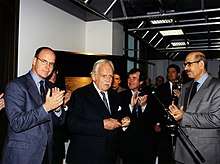
Prince Rainier smoked 60 cigarettes a day.[14] In the last years of his life his health progressively declined. He underwent surgery in late 1999 and 2000, and was hospitalized in November 2002 for a chest infection. He spent three weeks in hospital in January 2004 for what was described as general fatigue.[15] In February 2004, he was hospitalized with a coronary lesion and a damaged blood vessel.[16] In October he was again in hospital with a lung infection. In November of that year, Prince Albert appeared on CNN's Larry King Live and told Larry King that his father was fine, though he was suffering from bronchitis.[17]
On 7 March 2005, he was again hospitalized with a lung infection. Rainier was moved to the hospital's intensive care unit on 22 March. One day later, on 23 March, it was announced he was on a ventilator, suffering from renal and heart failure. On 26 March, the palace reported that despite intensive ongoing efforts to improve the prince's health, he was continuing to deteriorate; however, the following day, he was reported to be conscious, his heart and kidney conditions having stabilized. His prognosis remained "very reserved".[18]
On 31 March 2005, following consultation with the Crown Council of Monaco, the Palais Princier announced that Rainier's son, Hereditary Prince Albert, would take over the duties of his father as regent since Rainier was no longer able to exercise his royal functions.[19]
On 1 April 2005, the Palace announced that Rainier's doctors believe his chances of recovery were "slim".[20] On 6 April, Prince Rainier died at the Cardiothoracic Centre of Monaco at 6:35 am local time at the age of 81. He was succeeded by his only son, who became Prince Albert II.[21]
He was buried on 15 April 2005 beside his wife, Princess Grace, at the Cathedral of Our Lady Immaculate, the traditional burial place of princes and princesses of Monaco,[22] and the place where Prince Rainier and Princess Grace had been married in 1956.[23]
Because his death occurred shortly after that of Pope John Paul II, Rainier's death was overshadowed in the media.[23]
Titles, styles, honours and arms
Titles and styles
- 31 May 1923 – 2 June 1944: His Serene Highness Prince Rainier of Monaco
- 2 June 1944 – 9 May 1949: His Serene Highness The Hereditary Prince of Monaco
- 9 May 1949 – 6 April 2005: His Serene Highness Prince Rainier III, The Prince of Monaco
Honours
- Belgium: Knight Grand Cross of the Order of Leopold I
- Belgium: Recipient of the War Cross Medal 1940–1945
- Kingdom of Egypt Egyptian Royal Family: Knight Grand Cordon with Collar of the Royal Order of Muhammad Ali
- El Salvador: Grand Cross of the Order of Jose Matias Delgado
- France: Grand Cross of the Order of the Legion of Honour[24]
- France: Recipient of the War Cross Medal 1939–1945, Bronze
- France: Recipient of the Volunteer Combatant Cross Medal 1939–1945
- France: Recipient of the Combatant Cross Medal
- France: Recipient of the 1939–1945 War Commemorative Medal
- Kingdom of Greece Greek Royal Family: Knight Grand Cross of the Royal Order of the Redeemer
- Kingdom of Greece Greek Royal Family: Knight Grand Cross with Collar of the Royal Order of Saints George and Constantine
- Iran Iranian Imperial Family: Recipient of the Commemorative Medal of the 2,500-year Celebration of the Persian Empire[25]
- Italy: Grand Cross with Collar of the Order of Merit of the Italian Republic[26]
- Italy: Recipient of the War Merit Cross Medal
- Holy See: Knight Grand Cross with Collar of the Order of the Golden Spur
- Sovereign Military Order of Malta: Bailiff Knight Grand Cross of Justice of the Sovereign Military Order of Malta, Special Class
- Sovereign Military Order of Malta: Knight Grand Cross with Collar of the Order of Merit
- Lebanon: Recipient of the Medal of the Order of Merit
- Netherlands: Knight Grand Cross of the Order of the Gold Lion of the House of Nassau
- Panama: Grand Cross with Collar of the Order of Manuel Amador Guerrero
- Portugal: Grand Cross with Collar of the Military Order of Saint James of the Sword[27]
- Republic of San Marino: Grand Cross of the Equestrian Order of Saint-Marin[24]
- Sweden: Knight Grand Cross with Collar of the Royal Order of the Seraphim
- Kingdom of Yugoslavia Yugoslavian Royal Family: Knight Grand Cross of the Royal Order of the Star of Karađorđe
Awards
- France:
- International Automobile Federation: Recipient of the Gold Medal for Motor Sport
- IOC International Olympic Committee: Recipient of the Gold Olympic Order[28]
- United States:
- American Legion: Recipient of the American Legion Gold Medal, 1st Class
Ranks
- France:
- French Army
- Colonel
- French Army
Arms and emblems
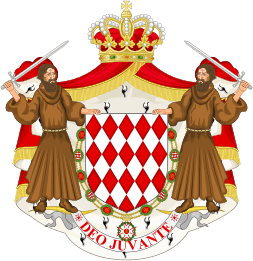 Coat of Arms of Prince Rainier III of Monaco |
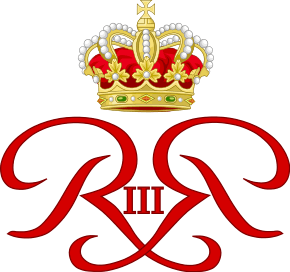 Royal Monogram of Prince Rainier III |
 Dual Cypher of Prince Rainier and Princess Grace |
Ancestry
| Ancestors of Rainier III, Prince of Monaco | |||||||||||||||||||||||||||||||||||||||||||||||||||||||||||||||||||||||||||||||||||||||||||||||||||||||||||||||||||||||||||||||||||||||||||||||||||||||||||||||||||||||||||||||||||||||||||||||||||||||||||||||||||||||||||||||||||||||||||||||||||||||||||||||||||||||||||||||||||||||||
|---|---|---|---|---|---|---|---|---|---|---|---|---|---|---|---|---|---|---|---|---|---|---|---|---|---|---|---|---|---|---|---|---|---|---|---|---|---|---|---|---|---|---|---|---|---|---|---|---|---|---|---|---|---|---|---|---|---|---|---|---|---|---|---|---|---|---|---|---|---|---|---|---|---|---|---|---|---|---|---|---|---|---|---|---|---|---|---|---|---|---|---|---|---|---|---|---|---|---|---|---|---|---|---|---|---|---|---|---|---|---|---|---|---|---|---|---|---|---|---|---|---|---|---|---|---|---|---|---|---|---|---|---|---|---|---|---|---|---|---|---|---|---|---|---|---|---|---|---|---|---|---|---|---|---|---|---|---|---|---|---|---|---|---|---|---|---|---|---|---|---|---|---|---|---|---|---|---|---|---|---|---|---|---|---|---|---|---|---|---|---|---|---|---|---|---|---|---|---|---|---|---|---|---|---|---|---|---|---|---|---|---|---|---|---|---|---|---|---|---|---|---|---|---|---|---|---|---|---|---|---|---|---|---|---|---|---|---|---|---|---|---|---|---|---|---|---|---|---|---|---|---|---|---|---|---|---|---|---|---|---|---|---|---|---|---|---|---|---|---|---|---|---|---|---|---|---|---|---|---|---|---|
| |||||||||||||||||||||||||||||||||||||||||||||||||||||||||||||||||||||||||||||||||||||||||||||||||||||||||||||||||||||||||||||||||||||||||||||||||||||||||||||||||||||||||||||||||||||||||||||||||||||||||||||||||||||||||||||||||||||||||||||||||||||||||||||||||||||||||||||||||||||||||
See also
- Prince Rainier Day
References
- "Prince Rainier III of Monaco". The Daily Telegraph. London. 7 April 2005.
- "Obituary: Prince Rainier III of Monaco.", The Times, London, 7 April 2005, pg. 58
- "Obituary: Giselle Pascal". The Independent. 8 February 2007. Retrieved 11 January 2014.
- "The House of Grimaldi: Rainier III- The Builder Prince of Monaco". HelloMonaco. 27 September 2016. Retrieved 30 March 2020.
- "Monaco Now | Rainier III, the Builder Prince". Monaco Now. 16 December 2019. Retrieved 30 March 2020.
- 1956: Prince Rainier marries Grace Kelly, BBC: On This Day. Accessed 31 May 2008.
- "Rearranged (1982)". IMDb.com. Retrieved 7 March 2017.
- "CNN.com – Transcripts". Transcripts.cnn.com. 15 April 2005. Retrieved 7 March 2017.
- Thilo Wydra (18 November 2014). "Grace: A Biography". Books.google.ca. Retrieved 7 March 2017.
- Dennis Barker. "Prince Rainier of Monaco | World news". theguardian.com. Retrieved 9 May 2014.
- "Monaco: Refreshing Rainier". Stamp Magazine. Retrieved 4 August 2014.
- "Museums". Why 100 of the world's top collectors will be in Monaco this weekend. Paul Fraser Collectibles. Archived from the original on 15 August 2014. Retrieved 4 August 2014.
- "Monaco Top Cars Collection". FIA Heritage Museums. FIA. Retrieved 4 August 2014.
- Dennis Barker. "Prince Rainier of Monaco | News". The Guardian. Retrieved 7 March 2017.
- "Prince Rainier moved to intensive care – World news – Europe". NBC News. 22 March 2005. Retrieved 9 May 2014.
- "Prince Rainier III, 81; Ruler Transformed Monaco, Made Grace Kelly His Princess". Los Angeles Times. 7 April 2005.
- Interview With Prince Albert of Monaco, CNN, 18 November 2004. Accessed 31 May 2008.
- "Rainier's condition 'stabilises'". BBC News. 27 March 2005. Retrieved 18 August 2008.
- Son of ailing Prince Rainier takes over duties, MSNBC, 31 March 2005. Accessed 31 May 2008.
- "Rainier's recovery chances slim, doctors say". CBC News. 1 April 2005. Archived from the original on 7 March 2009. Retrieved 18 August 2008.
- "Monaco's Prince Rainier, 81, dies". BBC News. 6 April 2005. Retrieved 18 August 2008.
- "Monaco Cathedral". Service Informatique du Ministère d'Etat (Monaco Minister of State Information Service). 28 July 2008. Archived from the original on 23 June 2008. Retrieved 18 August 2008.
- Randall, Colin (16 April 2005). "Monaco's farewell to its sovereign and friend". The Daily Telegraph. London. Retrieved 18 August 2008.
- Chiavassa, Henri (1964). The History of the Principality of Monaco as Seen Through its Postage Stamps. Monaco: Postage Stamp Issuing Office. Retrieved 28 December 2018.
- "Le onorificenze della Repubblica Italiana". Quirinale.it. 30 May 1953. Retrieved 7 March 2017.
- "CIDADÃOS ESTRANGEIROS AGRACIADOS COM ORDENS PORTUGUESAS – Página Oficial das Ordens Honoríficas Portuguesas". Ordens.presidencia.pt. Retrieved 7 March 2017.
- A few dates
External links
| Wikiquote has quotations related to: Rainier III, Prince of Monaco |
- Prince's Palace, Monaco, official website
- Cardinal Ratzinger sends condolences to Monaco on Prince Rainier's death
- The Monte Carlo Royal Palace – 360 degree QTVR
- Prince Rainier III of Monaco – Daily Telegraph obituary
Rainier III, Prince of Monaco Born: 31 May 1923 Died: 6 April 2005 | ||
| Regnal titles | ||
|---|---|---|
| Preceded by Louis II |
Prince of Monaco 1949–2005 |
Succeeded by Albert II |
| Monegasque royalty | ||
| Preceded by Charlotte |
Hereditary Prince of Monaco 1944–1949 |
Vacant Title next held by Caroline |
| Duke of Valentinois 1977–2005 |
Succeeded by Albert II | |
| Preceded by Louis II |
Marquis of Baux 1944–1958 | |
